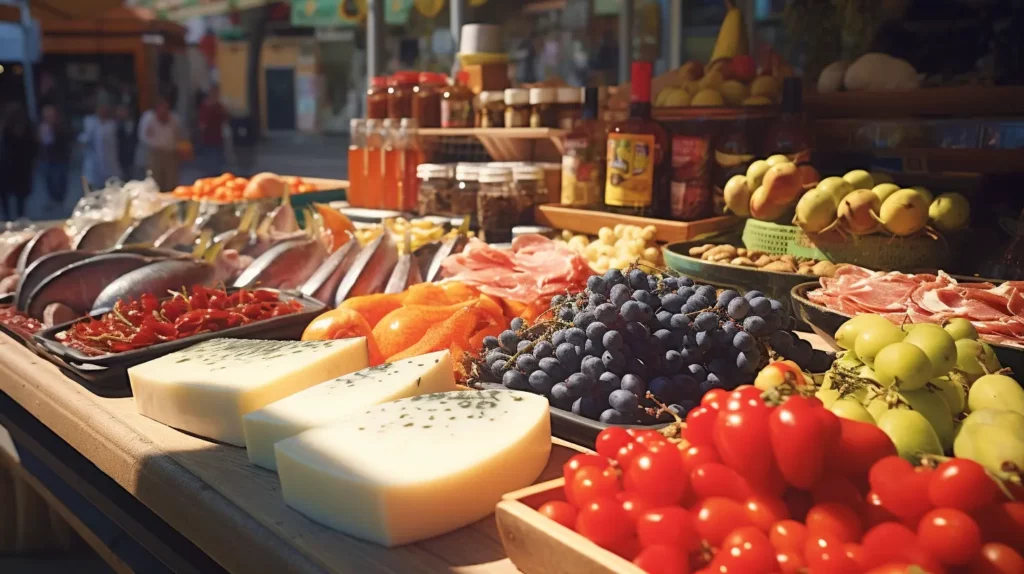Spain is renowned for its culinary traditions and vibrant food culture.
Exploring the local markets and grocery stores in Spain is an exciting experience that allows you to immerse yourself in the country’s rich gastronomy.
In this article, we will provide you with a guide to buying fruits, vegetables, and groceries in Spain, while introducing you to some unique and unusual varieties of produce and other foods that are native to the country.

Essential Vocabulary
Before delving into the world of Spanish markets, let’s familiarize ourselves with some essential Spanish terms:
- Fruits: Frutas
- Vegetables: Verduras
- Market: Mercado
- Grocery store: Supermercado
- Fresh: Fresco/a
- Ripe: Maduro/a
- Organic: Ecológico/a
- Seasonal: De temporada
- Bread: Pan
- Cheese: Queso
- Meat: Carne
- Fish: Pescado
- Olive oil: Aceite de oliva
Popular Fruits, Vegetables, and Other Foods
Spain offers a wide variety of fresh produce and local delicacies that are beloved by both locals and visitors. Here are some commonly found options:
- Oranges: Naranjas
- Apples: Manzanas
- Tomatoes: Tomates
- Potatoes: Patatas
- Onions: Cebollas
- Garlic: Ajo
- Olives: Aceitunas
- Cured Ham: Jamón
- Spicy Sausage: Chorizo
- Spanish Omelette with Potatoes and Eggs: Tortilla española
- Rice Dish with Seafood or Meat: Paella
- Cold Tomato Soup: Gazpacho
- Fried Dough Pastry, often served with hot chocolate: Churros
Unique and Unusual Fruits, Vegetables, and Other Foods in Spain
Spain is also known for its unique and regional specialties that may be less familiar to international visitors. Here are a few examples along with their descriptions:
- Padrón peppers: Pimientos de Padrón are small green peppers from the town of Padrón. Most are mild, but some can be surprisingly spicy. They are typically fried and sprinkled with sea salt before serving.
- Persimmons: Caquis or Kaki are orange fruits with a sweet and delicate flavor. They can be enjoyed fresh or used in desserts and jams.
- Baby eels: Angulas are a delicacy in Spain. These small, translucent eels are typically served sautéed in olive oil and garlic.
- Quince: Membrillo is a fruit that resembles a pear but is hard and sour when raw. It is commonly used to make a sweet and dense jelly called dulce de membrillo.
- Octopus: Pulpo is a popular seafood in Spain, often served as pulpo a la gallega, which is boiled octopus drizzled with olive oil and sprinkled with paprika.
Exploring the Markets
Visiting Spanish markets is a feast for the senses.
Engaging with vendors using simple phrases like ¿Cuánto cuesta? (How much does it cost?) and ¿Está fresco/a? (Is it fresh?) allows you to interact with them and learn more about their products. Take the time to explore the market stalls, sample local specialties, and embrace the vibrant atmosphere.
Summary
Buying fruits, vegetables, and groceries in Spain is a culinary adventure that allows you to discover the country’s diverse flavors and unique food culture. By familiarizing yourself with essential vocabulary, exploring popular produce and regional delicacies, and engaging with local vendors, you can fully immerse yourself in the vibrant Spanish food scene.
Whether you’re strolling through the bustling markets, perusing the aisles of a supermercado, or indulging in the local specialties, Spain offers a plethora of fruits, vegetables, and other foods to tantalize your taste buds. From the juicy oranges of Valencia to the savory jamón of Jabugo, each region has its own culinary treasures waiting to be discovered.
Take the time to savor the flavors of Spain, sample the unique fruits like caquis and membrillo, and explore the traditional dishes such as paella and gazpacho. Engage in conversations with the vendors, ask for recommendations, and embrace the opportunity to learn more about the local ingredients and cooking techniques.
Whether you’re an adventurous foodie or a curious traveler, buying fruits, vegetables, and groceries in Spain provides a wonderful opportunity to experience the country’s rich gastronomic heritage. So, venture into the markets, embrace the Spanish vocabulary, and savor the diverse flavors that make Spain a true paradise for food lovers.
¡Buen provecho! (Enjoy your meal!)
Finally, Spanish teachers worth your time!
Experience the LingoToGo difference for yourself with a free week of unlimited lessons.
Expert teachers, raving students, guaranteed fun.
No credit card required. No obligation.

